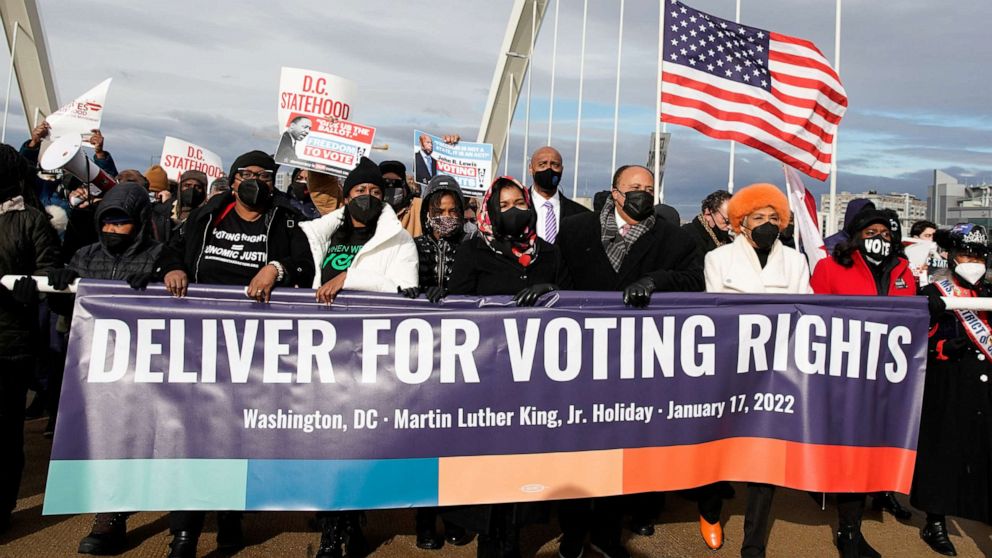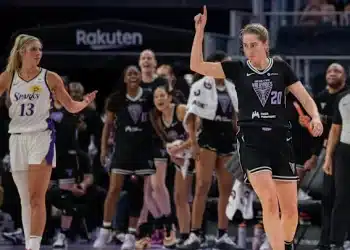By: Zachary Draves
It has been said that democracy is not a spectator sport and for good reason.
A system of government for the people, by the people, and of the people requires participation
and an active citizenry.
It should also expect that active citizenry to not sit idly by while hard-earned rights are being stripped away in the name of a big lie.
That’s exactly what is happening right now with the ongoing attacks on voting rights and the current debate to pass federal legislation.
According to the Brennan Center for Justice, From January 1 to December 7, 2021, at least 19 states passed 34 laws restricting access to voting, and more than 440 bills with provisions that restrict voting access have been introduced in 49 states during this past year’s legislative sessions.
Think about that, all but one state introduced a voter suppression bill.
All of which are rooted in the big lie that the 2020 election was somehow rigged and stolen.
Furthermore, the impact of these bills will have a disproportionate impact on communities of color specifically when it comes to strict Voter ID measures.
From the Brennan Center:
Using county-level turnout data around the country, researchers demonstrated that the racial turnout gap grew when states enacted strict voter ID laws.
Researchers have also looked specifically at the turnout of individuals in North Carolina without proper identification, and they found that the enactment of the law reduced turnout. The turnout effects continued even after the strict voter ID law was repealed.
Another study shows that voters in Texas who would be barred from voting absent the state’s “Reasonable Impediments Declaration” (a court-ordered remedy allowing voters without proper IDs to participate) are disproportionately Black and Latino. The study argues that its “findings indicate that strict identification laws will stop a disproportionate minority, otherwise willing set of registered voters from voting.”
An article using a similar methodology and administrative records found that voters of color in Michigan were more likely to show up to the polls without proper identification.
Yet another study used survey data to demonstrate that voters of color in states across the country lacked access to the needed IDs to vote in their state.
While some studies have argued that voter IDs have little effect on overall turnout, it is clear that voters of color are less likely to have the IDs needed to participate.
Additional barriers to early voting, problems with polling consolidation, and difficulty voting on the weekends are outlined here https://www.brennancenter.org/our-work/research-reports/impact-voter-suppression-communities-color.
So when looking at the totality, this reflects a grave assault on democracy and is a complete slap in the face to the generations prior who fought and died for this sacred right and it ultimately discourages democratic participation.
In other words, when people can’t vote and when they are discouraged from voting altogether, democracy itself is doomed.
So where does the sports world come into this?
Their cultural cache can do plenty and they have already demonstrated their power when it pertains to this issue.
During the 2020 election, LeBron James formed his More Than a Vote organization that actively works to combat voter suppression and provides resources on voter engagement.
Various teams across all leagues converted their arenas into polling locations.
The WNBA led by the Atlanta Dream changed the course of political history in Georgia as they organized and mobilized Georgia voters to oust former Dream Co-Owner and disgraced Senator Kelly Loeffler after she made disparaging remarks about Black Lives Matter.
This past year, the player’s associations from the NBA, WNBA, NFL, MLS, NWSL, and others released a statement in support of voting rights and opposing these voter suppression tactics.
MLB pulled its All-Star Game out of Atlanta in response to Georgia’s recent law.
So the sports world has done its part in various ways but with a crucial election on the horizon and voter suppression only getting worse with a lack of federal action, there is much more that can be done.
In order to get a sense of what’s happening on the ground, I had the chance to interview Jared Shanker, Director of Communications for RISE, a national organization that educates and empowers the sports community to address racial injustice and promote civic engagement.
With the issue of voter suppression and voting rights at the forefront of the national agenda in ways we haven’t seen in years, where does RISE stand?
Beginning in 2017, RISE was the first organization focused on empowering the sports community to become national leaders for improving civic engagement and voter participation in our country. Our non-partisan initiative equipped athletes, coaches, and staff at all levels of sport with the tools and knowledge to register to vote, participate in elections and inspire their fans to get involved and become informed and engaged citizens. The result was that in 2020 RISE helped leverage the power of sports to contribute to a record turnout in the 2020 U.S. election. Turnout was also buoyed by more than 40 sports venues serving as polling stations, and it’s estimated nearly 300,000 people voted at those sites. RISE, including Board Members Paul Tagliabue, Scott Pioli, and Jocelyn Benson, played a critical role in opening those venues. However, the response from an overwhelming number of legislatures has been to restrict rather than celebrate historic voter turnout. Such crackdowns on civil rights represent a true assault on patriotic ideals. RISE believes we all have a responsibility to act and use our power, resources, and influence to aid in efforts that assure all citizens are able to fairly make their voices heard and have their votes counted.
Given the work that athletes such as LeBron James have done with his More Than a Vote Initiative and leagues like the WNBA in making political history in Georgia in the past election, how vital is it for athletes to be civically minded and active in our present-day?
The sports community at all levels can provide an essential influence to inspire social change. There are many ways they can use their platforms to raise awareness about injustice, advocate for racial equity, and encourage others to take steps to bring about change. Athletes advocating for voter education, participation, and activation can have a significant influence on civic engagement in this country. Our Road To Progress, which you can access at risetowin.org/champions and will be featured as part of our Champions of Change experience at Super Bowl Experience, highlights the historical intersection of sports and social justice, which includes the sports community using its voice to educate and activate voters. A recent example is just on Jan. 18, when RISE chair Paul Tagliabue, the former commissioner of the NFL, organized a letter with sports leaders with West Virginia ties to be sent to Senator Joe Manchin and Majority Leader Chuck Schumer. The letter, which includes Nick Saban, Jerry West, Darryl Talley, and Oliver Luck along with Paul, supports the passage of much-needed, balanced legislation with proven safeguards for voter participation and election integrity. Additionally, all of us, not just the sports community, should be committed to broad civic engagement that goes beyond voting, too.
How can people get involved with RISE?
To get involved with RISE, please follow us on social media @RISEtoWIN and visit our website risetowin.org, where you can take the RISE Pledge to End Racism, access valuable resources and digital modules, and bring RISE to your community.


 NFL
NFL





